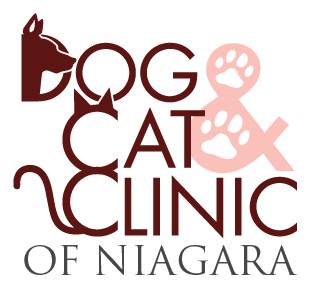At the Dog & Cat Clinic we are very passionate about wellness achieved through nutrition. There are many myths and misunderstandings about nutrition and we like to help our clients decipher the facts. What is most important regarding nutrition is that cats and dogs eat an excellent quality protein source to satisfy their carnivorous appetite. Good quality meat protein is expensive and therefore good quality cat and dog food is expensive.
Most mainstream popular pet foods are actually equivalent to junk food and unfortunately labels do not indicate the quality of protein used. It is untrue that ingredients listed as by-products on nutrition labels are inferior to meat products. All pet foods contain some form of by-products and they can provide excellent sources of nutrition for pets, including animal fats and proteins and vegetable pulp. Having meat as the first ingredient on a label does not indicate that it is of higher quality, this simply refers to quantity as ingredients are listed in order of decreasing weight that is determined prior to processing.
We often get a lot of questions asking us about the value of corn and grain in a pet’s diet. It is a common misconception that corn is simply a filler. A filler actually refers to something that is not digested and therefore is rendered useless to the animal consuming it. Corn, however, can be both a very nutritious and digestible ingredient when cooked properly and finely ground. In this case it provides energy, protein, amino acids, and omega fatty acids that specifically help to promote a soft and healthy coat. Additionally, it is an excellent carbohydrate, providing antioxidants and fibre to aid in digestion. Corn also provides methionine that assists in maintaining bladder health.
In terms of grain-free foods, there is no nutritional foundation to support the need to offer a pet a grain-free diet, and foods that contain grains are just as digestible as grain-free foods.
Raw foods are not recommended because of the increased risk of food poisoning, parasitic infection, and nutrient deficiencies. Bones contained in raw food can also cause damage to teeth, throat, and the gastrointestinal system.
Lastly, do not be fooled by pet food that it labelled “organic,” “all natural,” or other similar names. There is little regulation governing these terms and their use is a way to increase profit.
At the Dog & Cat Clinic we recognize the importance of using food as medicine and we offer a variety of diets that may be used as an alternative or in conjunction with prescription medications. Mobility diets contain glucosamine and chondroitin for arthritis, renal diets contain support for kidney disease, hypoallergenic diets can help with an assortment of allergies, urinary diets can support bladder health, thyroid diets can control hyperthyroidism, and the Calm diet can help settle even the most anxious or stressed pet.
When there is not a particular health concern to address it is most important that cats and dogs are fed a food appropriate for their life stage, whether it is a kitten/puppy formula, adult diet, or senior variety. Always consult your Veterinary team to ensure that these diets are appropriate and best suited for your pets health. At the Dog & Cat Clinic we firmly believe in wellness through nutrition and would be glad to recommend an appropriate diet that is most beneficial for each cat that we see.
